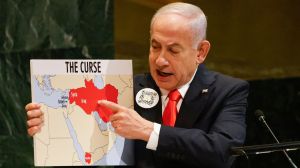Muslims need to establish political clout
To be politically effective, Muslim India must not only go on listing grievances. Rather, it must define its long-term goals and work out it...

To be politically effective, Muslim India must not only go on listing grievances. Rather, it must define its long-term goals and work out its strategy if it aspires to be a player in the political arena. Above all it needs unity and organisation.
The political strategy of encircling the high caste Hindu elite, by the oppressed Muslim making common cause with the oppressed Hindu, has failed. Because, while every section of the oppressed Hindu masses has a Laloo or Mulayam or Kanshi Ram or Paswan with a political infrastructure, oppressed Muslim masses have no equivalent.
Second, they are increasingly doubtful whether the Forward Shudras, now on the upswing, will treat the Muslim collaborators any better than the High Castes. The Forward Shudras (about 20 per cent) are now exploiting the Backward Shudras (30 per cent). They are anxious to have the Muslims on their side, to add to their strength, at bargain basement price.
What are the alternatives before Muslim Indians? The first is an alliance of the oppressed. Muslims, MBCs, SCs and STs are natural allies. Yet it is doubtful whether Muslim Indians are in a position to make common cause with MBCs, SCs and STs.
First, MBCs like Muslims have no separate or independent leadership. Second, Muslim Indians feel psychologically hesitant to take the initiative. They feel comfortable with the High Castes and the Forward Shudras and do not know if the MBCs, SCs and STs want them as equal partners. But in any case for establishing a viable relationship with any other group, Muslim Indians need to be represented by a body.
MODEL I
A Muslim political authority: Many attempts have been made to form a national forum or consultative committee but always at the top. They failed for two reasons.
First, any initiative in Delhi couldn’t reach the last panchayat. Why not begin at the panchayat level and then move upward? Second, the closed-door policy of Muslim politicians and ulema kept out the Muslim intelligentsia and emergent professional and entrepreneurial classes.
Supposing Muslim Indians evolve an authority (short of a political party) that commands the allegiance of all Muslim Indians in states and constituencies of Muslim concentration, then relevant political parties would vie for an understanding with it. Obviously with consequent Muslim support, secular parties would win the Muslim-majority seats as well as many Muslim concentration seats. One may envisage a series of understandings with parties, state-by-state, or even constituency-by-constituency.
MODEL II
A Muslim political party: Muslim Indians have been long fed the hypothesis that if they form a Muslim party, the BJP will find it easier to mobilise Hindus. This is possible but not probable because of caste and Mandalisation.
No parliamentary constituency is socially homogeneous. Since Hindus form an overwhelming majority, say 80 per cent, of the electorate on an average, there shall be a multiplicity of Hindu candidates. It is possible the candidate of the Muslim party may win, it is also probable that Hindutva candidate may win.
It is equally probable a secular party representing the biggest caste group in the constituency, in adjustment or alliance with the Muslim party, may win. It is possible that such a party may seek in one constituency and offer support to the Muslim party in another.
So far Laloo Prasad Yadav and Mulayam Singh Yadav did not have to make a deal with a Muslim party simply because there was no Muslim party worth the name. So they short-changed Muslims; they took advantage of Muslim votes for their Yadav and non-Yadav Hindu candidates, but failed to deliver Yadav/non-Yadav votes to their own Muslim candidates in Muslim concentration constituencies.
Yet a Muslim party, speaking for Muslims only and using Islamic rhetoric may not be an acceptable partner for secular parties.
MODEL III
A Muslim-based secular party: Fifty years after Independence, Muslim Indians are seriously considering a secular party in which they occupy the driver’s seat but whose doors are open to all, which stands squarely for national unity and integrity, demands fair and proportionate participation in governance and society for all identifiable communities, irrespective of religion, caste, region or language.
The formation of the Insaf Party (1989-91) was an experiment in this direction. But it was premature.
With such a secular party of their own, Muslim Indians can play the electoral game more effectively. The party can negotiate on terms of equality with all Hindu majority secular parties and formulate a common programme. Such a programme will safeguard legitimate interests of all deprived sections — Backward Backwards, SCs and STs and Muslims — while protecting those of the High Castes and the Forward Backwards. The Muslim-based secular party may form an alliance with another secular party with a base among MBCs, SCs and STs.
If the alliance works, these parties may eventually merge to form one party representing 65 per cent of the Indian people.
(The author is a former MP)
TOMORROW: Why migration and ceaseless jehad are not options







- 01
- 02
- 03
- 04
- 05
























